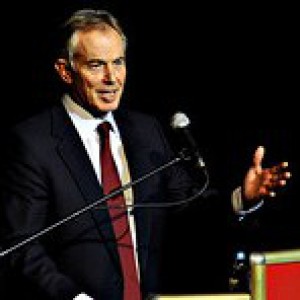Tony Blair optimistic about economic plan for Palestinian territories

Tony Blair, the former British prime minister, said a $4bn economic plan being drafted alongside Arab-Israeli peace negotiations will be ready to launch within weeks but he acknowledged that securing Israeli approval for investments in areas under its administrative control would be “tough”.
Mr Blair also confirmed a proposed $1bn project led by BG to drill for gas off the Gaza Strip and supply the West Bank via Israel, which Palestinian and Israeli officials discussed with the Financial Times last week.
“For the first time in over a decade, there is a serious prospect Gaza gas actually happens,” he said on Tuesday in an interview. “The Palestinian side is resolved; the Israeli side will take a little longer.”
Mr Blair was in Jerusalem in his capacity as representative of the Middle East Quartet, comprising the US, the EU, Russia, and the UN, which is responsible for overseeing the economic plan, announced by John Kerry, US secretary of state, in May. The plan is meant to run in parallel with revived Israeli-Palestinian peace talks, and Mr Blair said it would be executed by “a mix of public policy people and private sector people”.
“The plan will be ready in the next few weeks,” Mr Blair said. “There is broad support for the ideas, but it all depends on the implementation.”
Mr Blair’s office published an executive summary of the plan ahead of a donors’ meeting for the Palestinians held in New York last month. It proposes projects in eight economic sectors, including energy, agriculture, construction, tourism, and information technology, with the aim of reviving the Palestinian economy and ending its dependence on foreign aid.
“If you did these things, the Palestinians wouldn’t need economic support,” Mr Blair said. “The whole thing is done and constructed so that there are no risks with Israeli security.”
Sceptical Palestinian and Israeli analysts have warned that the plan’s chances of success are slim without a significant easing of the tight restrictions Israel imposes in Area C, the 60 per cent of the West Bank where it exercises full civilian and military control.
Area C houses the bulk of Israeli settlers, and Israel would need to agree significant relaxation of controls it exerts in planning, movement, and other areas if proposed projects for Palestinian housing, tourism, minerals and other industries there are to go forward.
At last month’s donors’ meeting, Israel announced a series of economic concessions to the Palestinians, including promises for an overdue upgrade of the cellular network and an easing of restrictions on private imports of construction materials into the Gaza Strip.
However, Israel subsequently cut off imports of construction materials to Gaza last week after unearthing a 1.7km-long “terror tunnel” it claimed was supported by Hamas with the aim of attacking civilian or military targets in Israel. Mr Blair acknowledged that it had been “two steps forward, one step back, but in this context that’s progress.”
He also said that the need to secure Israeli permits in Area C “will be a tough part of the negotiation”.
The peace talks, which were launched in late June under Mr Kerry’s sponsorship, have seen Israeli and Palestinian negotiators meet several times in secret to discuss issues around a future Palestinian state, including borders and security arrangements with Israel.
Maariv, the Israeli newspaper, reported on Tuesday that the talks, which are being held in secret were “on the verge of explosion” over the issue of borders. The paper said that Israel was demanding that its troops be permanently stationed along the Jordanian border, but the Palestinians were vehemently opposed to this.
Mr Blair declined to comment on the talks’ progress. “The most important thing about the negotiations is that the negotiators be allowed to do it without people speculating,” he said.
By John Reed in Jerusalem
October 15, 2013